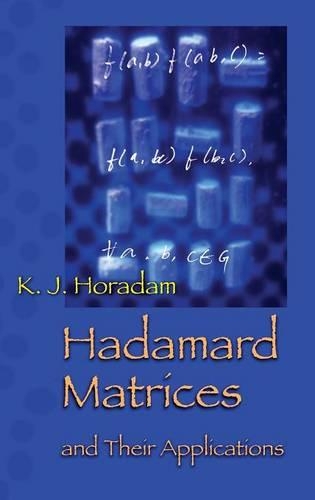
Hadamard Matrices and Their Applications
(Hardback)
Publishing Details
Hadamard Matrices and Their Applications
By (Author) K. J. Horadam
Princeton University Press
Princeton University Press
12th February 2007
United States
Classifications
Professional and Scholarly
Non Fiction
511.6
Physical Properties
Hardback
280
Width 152mm, Height 235mm
510g
Description
In Hadamard Matrices and Their Applications, K. J. Horadam provides the first unified account of cocyclic Hadamard matrices and their applications in signal and data processing. This original work is based on the development of an algebraic link between Hadamard matrices and the cohomology of finite groups that was discovered fifteen years ago. The book translates physical applications into terms a pure mathematician will appreciate, and theoretical structures into ones an applied mathematician, computer scientist, or communications engineer can adapt and use. The first half of the book explains the state of our knowledge of Hadamard matrices and two important generalizations: matrices with group entries and multidimensional Hadamard arrays. It focuses on their applications in engineering and computer science, as signal transforms, spreading sequences, error-correcting codes, and cryptographic primitives. The book's second half presents the new results in cocyclic Hadamard matrices and their applications. Full expression of this theory has been realized only recently, in the Five-fold Constellation.This identifies cocyclic generalized Hadamard matrices with particular "stars" in four other areas of mathematics and engineering: group cohomology, incidence structures, combinatorics, and signal correlation. Pointing the way to possible new developments in a field ripe for further research, this book formulates and discusses ninety open questions.
Reviews
"This book is a marvelous and timely contribution to a rapidly developing field, with new oflshoots into physics, engineering and algebra... Overall, the text gives an excellent introduction to Hadamard matrices, a masterful short survey of applications the field of communications, and a wild ride through these new algebraic tools and new combinatorial objects of study being spawned by this modern approach. Absolutely up-to-date and useful, his is a must-have text for all researchers in this field, and a must-read for aspiring researchers of Hadamard matrices, their generalizations, and their applications."--Robert Craigen, Mathematical Reviews
Author Bio
K. J. Horadam is Professor of Mathematics and leads the Information Theory and Security Research Group at RMIT University, Melbourne, Australia.
